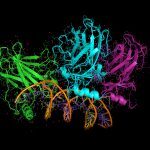Lien vers Pubmed [PMID] – 19811823
Leuk. Res. 2010 Apr;34(4):498-506
The proteasome plays a critical role in the regulation of many cellular processes, including the cell cycle and tumor growth. The proteasome inhibitor bortezomib has recently been approved for the treatment of relapsed and refractory multiple myeloma. In this study, we investigated the induction of apoptosis by proteasome inhibitors in several human acute myeloid leukemia (AML) cell lines and in primary cells from patients. We demonstrate that these drugs induce a high level of apoptosis in the KG1a cell line, in which the therapeutic drug daunorubicin is poorly active, compared to other AML cell lines. In parallel, we found that significantly different levels of apoptosis were induced in primary cells from patients depending on the FAB-based differentiation status of these cells. Moreover, the level of 20S proteasome in KG1a cells was also high compared to other AML cell lines, suggesting a relationship between the high sensitivity to proteasome inhibitors and an elevated amount of 20S proteasome. In good accordance, we identified two groups of patient cells expressing high and low levels of 20S proteasome, with respective high and low sensitivity to proteasome inhibitors. Further comparison of the proteasome status in KG1a and U937 cells also suggests that a high proportion of the 19S regulatory complex in U937 cells compared to the 20S core complex may explain an increased proteasome activity. Altogether, our results suggest that various AML subtypes may present different responses to proteasome inhibitors, that these molecules can be potentially considered as interesting therapeutic alternatives for these pathologies, and that the amount of 20S proteasome in AML cells may be predictive of the cellular response to these inhibitors.



